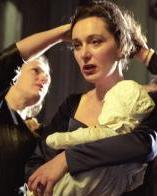SEARCH CurtainUp
REVIEWS
FEATURES
NEWS
Etcetera and
Short Term Listings
LISTINGS
Broadway
Off-Broadway
BOOKS and CDs
OTHER PLACES
Berkshires
London
LA/San Diego
DC
Philadelphia
Elsewhere
QUOTES
On TKTS
LETTERS TO EDITOR
FILM
LINKS
MISCELANEOUS
Free Updates
Masthead
NYC Weather
 London Review
London Review
Iphigenia at Aulis
by Charlotte Loveridge
|
Nothing could be worse than being caught in a trap as appalling as this.
--- Agamemnon |

Kate Duchęne (Clytemnestra) with members of the company
(Photo: Ivan Kyncl) |
King Agamemnon (Ben Daniels), the commander of the Greek army, is faced with the tragic dilemma of choosing between his beloved daughter Iphigenia (Hattie Morahan) and success in the Trojan War. This war was caused by Menelaus' wife Helen leaving him for the Trojan son of Priam, Paris. Because the Greek fleet is trapped by unfavourable winds en route to Troy, the prophet Calchas has prescribed the sacrifice of Iphigenia in order to propitiate the gods. Agamemnon therefore entices his daughter to Aulis on the pretext of a wedding-match with Achilles.
An excellent performance from Ben Daniels as Agamemnon conveys his excruciating ambivalence, followed by a sense of horrendous inevitability. Dominic Rowan as his brother Menelaus, mirrors Agamemnon's power and status, but not his dilemma. Kate Duchęne (Clytemnestra) is the self-possessed, proper and stern wife of Agamemnon, who reveals her fierce maternal love when the threat against he daughter becomes clear. Her strong performance implies that the tragedy is far from resolved with Iphigenia's death, hinting at her murderous revenge against Agamemnon after the Trojan war, which was well-known to the original audience. Hattie Morharan portrays an initially child-like Iphigenia who progresses from speechless, gasping terror into courageous acceptance of her death in order to save her family from the army's slaughterous frustration. Achilles (Justin Salinger) is portrayed as a vain and shallow character. Rather than the supreme warrior of legend, this Achilles is uncharacteristically small in stature, reflecting how the pre-eminent figures of myth have been refashioned as statesmen and politicians.
The chorus are a timorous band of women, awed by the celebrity-like stature of the principal characters. Behind this barrier of deference, they dare no criticism of the questionable sacrifice, but mouth inane platitudes as their only insight into the play's action. Throughout, they repeat the stage-action of rushing to the edges of the stage to peer beyond, adding to the atmosphere of suspense and anxiety. Their version of choric dancing is ballroom dancing, poised with no partners and enacted to the randomly intermittent blasts of music. This compounds the sense of their powerlessness without men in the masculine, public world of waging war.
The moral corruption of this public sphere is reflected by the dusty and delapidated set. Don Cheadle's translation is lucid and smooth, with clarity as its successfully-achieved main objective. Katie Mitchell's direction is well-suited to the translation, ignoring a specific contemporary localisation, despite the obvious and tempting parallels with suicide bombers. Instead, the perennial interest of the situation is portrayed, and she has delivered another accomplished adaptation of an ancient Greek play, recreating the emotional complexity and moral ambivalence of the original. With an extremely commendable cast, Katie Mitchell conveys Euripides' tragedy of an innocent's death for the cause of war, a bitter prelude to the subsequent Greek victory, adulterating in advance the later martial glory with murder and guilt.
| Iphigenia at Aulis
Written by Euripides Translated by Don Taylor Directed by Katie Mitchell Starring: Ben Daniels, Kate Duchęne With: Peter Needham, Annamaria Adams, Kristin Hutchinson, Helena Lymberry, Penelope McGhie, Sarah Malin, Charlotte Roach, Susi Trayling, Dominic Rowan, Hattie Morahan, Justin Salinger, Sean Jackson, Martin Hodgson Designer: Hildegarde Bechter Lighting Designer: Chris Davey Sound: Gareth Fry Movement Director: Struan Leslie Music: Paul Clark Running time: Two hours 15 minutes without an interval Box Office: 020 7452 3000 Booking to 7th September 2004 Reviewed by Charlotte Loveridge based on 24th June 2004 Performance at the Lytellton Theatre Royal National Theatre, South Bank, London SE1 (Tube/Rail Station: Waterloo) |


Mendes at the Donmar
Our Review

Peter Ackroyd's History of London: The Biography

London Sketchbook

Retold by Tina Packer of Shakespeare & Co. Click image to buy.
Our Review

6, 500 Comparative Phrases including 800 Shakespearean Metaphors by CurtainUp's editor.
Click image to buy.
Go here for details and larger image.
